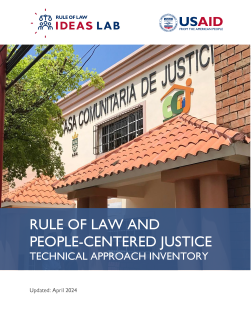With the release of the Rule of Law Policy in 2023, USAID continues to innovate the design and implementation of rule of law programs and activities intended to close the global justice gap, build public trust, and support democratic and accountable governance around the world. USAID’s pivot to integrating a People-Centered Justice approach in rule of law programs and activities starts with identifying and understanding what people want and need when they seek justice. USAID rule of law programming also works to remove the many obstacles and costs people can face when seeking justice, improve their experience, and enhance the outcomes they receive by putting their legal problems and justice needs at the center of the justice systems and services that USAID’s programs and activities seek to strengthen.
To be clear, People-Centered Justice approaches do not ignore the importance of rule of law and justice institutions. Rather, they seek to improve institutional performance and strengthen both formal and informal mechanisms to deliver justice for all. Similarly, justice seekers and their problems are diverse and therefore require multiple pathways and tools to facilitate cost-effective solutions that fit their particular needs. While it is important for individuals to “have their day in court,” the goal is actually to solve their legal problems whether they are criminal, civil, or administrative in nature and improve their experiences. People-Centered Justice approaches also seek to prevent as well as remedy legal problems and satisfy justice needs.

